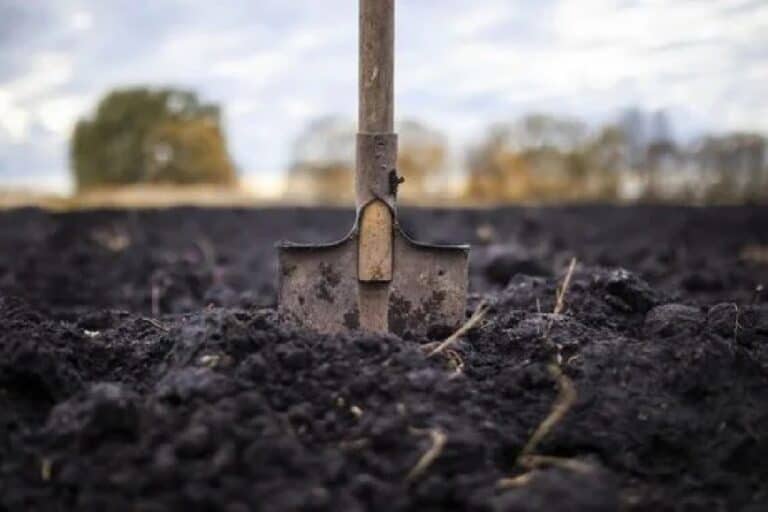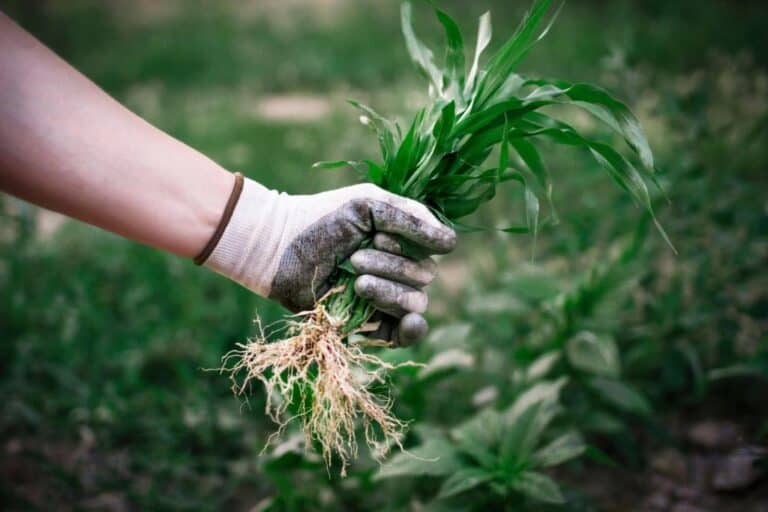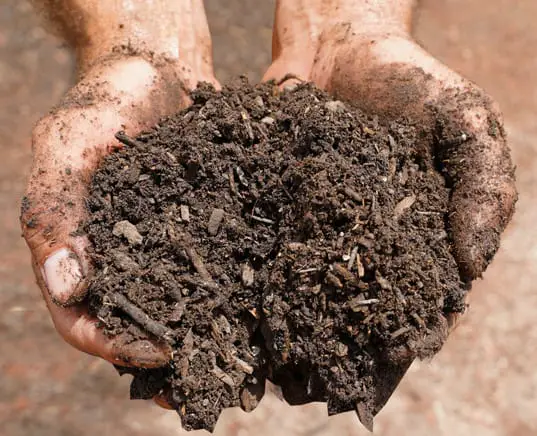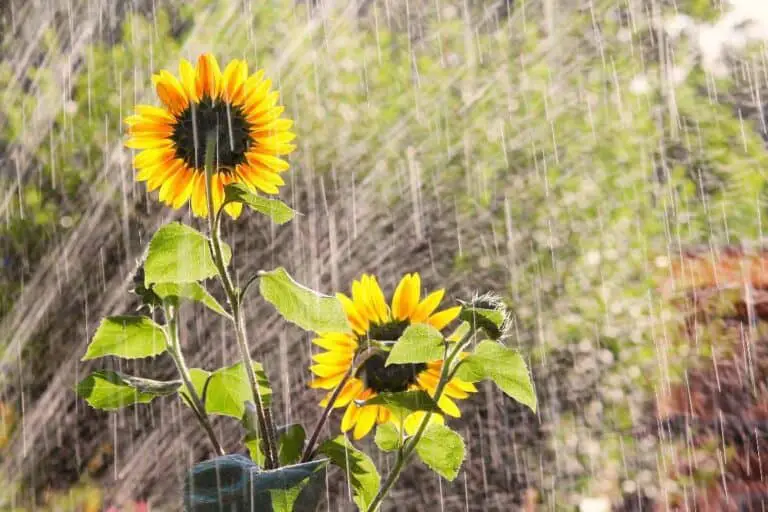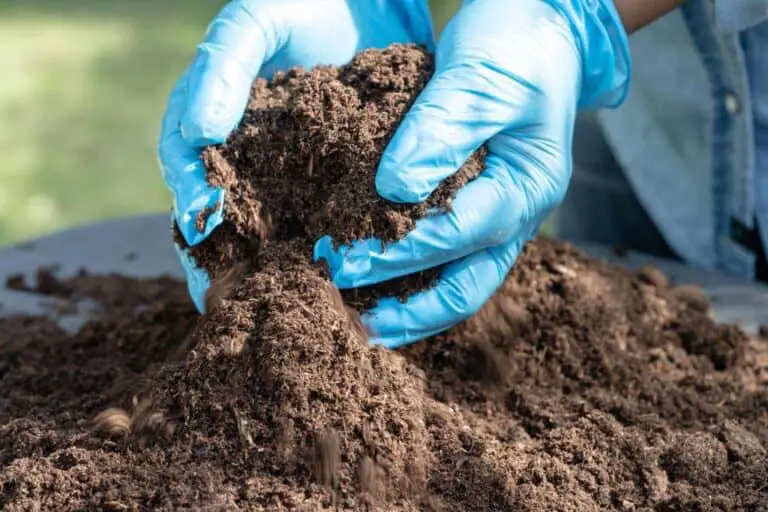Can You Use Black Mulch Around Trees? Good or Bad?
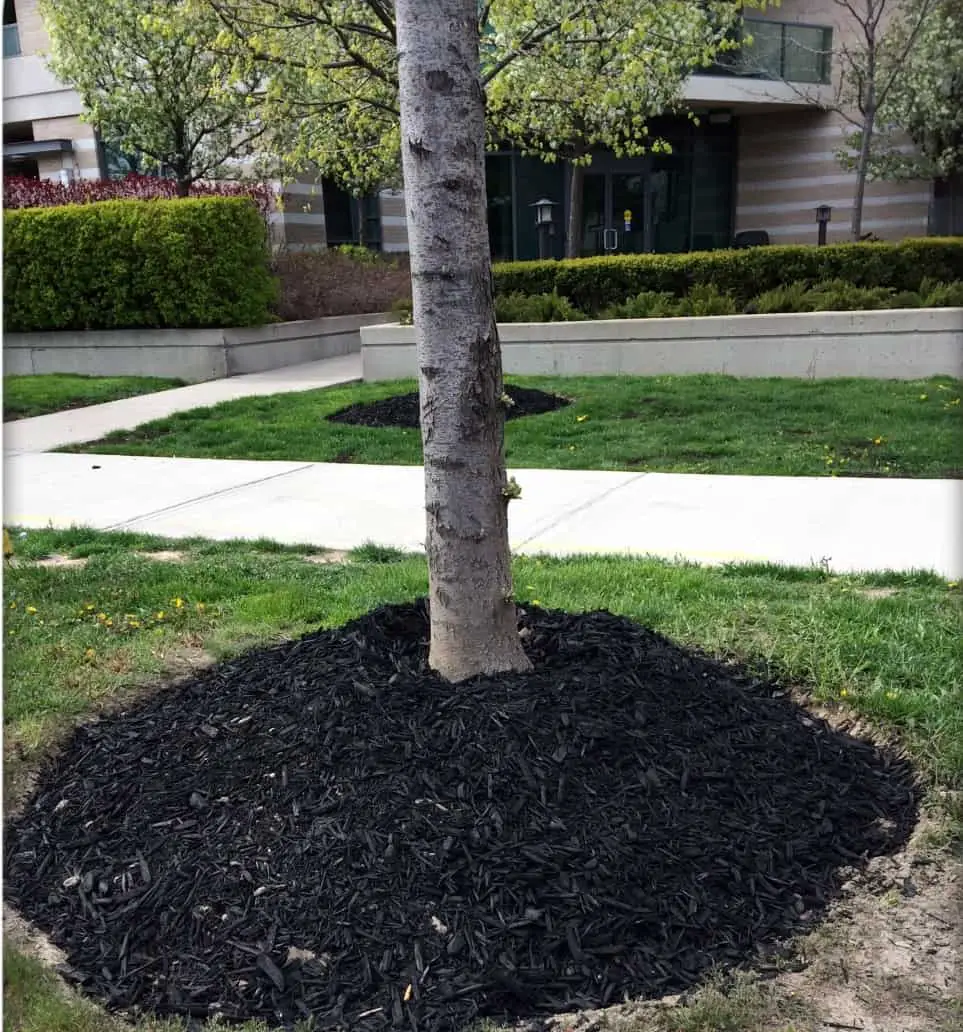
If you are a homeowner or a landscaper, you may be wondering if it’s a good idea to use black mulch around trees. Mulch is an important part of any garden or landscape because it helps keep water in the soil, keeps the soil at the right temperature, and stops weeds from growing.
But with so many types of mulch available, it can be hard to know which one is best for your trees. One popular choice is black mulch, which is known for looking nice and making the colors of flowers and leaves stand out.
However, some gardeners may be hesitant to use black mulch around trees, fearing it may be harmful. So, can you use black mulch around trees? Is it good or bad?
In this article, we’ll explore the pros and cons of using black mulch around trees and help you make an informed decision for your garden. So, let’s get started!
What is Black Mulch?
Black mulch, also known as dyed mulch, is a type of mulch that has been colored black with a water-based dye. It is made from a variety of materials, including wood chips, bark, and shredded leaves. The dye used to color the mulch is usually made from iron oxide or carbon black, which are considered safe for plants and the environment.
Black mulch is popular among homeowners and landscapers because of its rich color, which provides a sharp contrast to the greenery in a landscape. It is also long-lasting and helps to suppress and kill weeds growth and retain moisture in the soil.
Can You Use Black Mulch Around Trees?
Yes, you can use black mulch around trees, but there are some things to consider before doing so. While black mulch can improve the appearance of your landscape, it may not be the best choice for your trees’ health.
Here are some factors to keep in mind when deciding whether to use black mulch around trees:
1. Heat Retention
Black mulch absorbs and retains more heat than natural mulch, such as wood chips or bark. This heat can be harmful to young trees or trees with shallow root systems, which are more susceptible to heat stress. If you live in a hot climate or have trees that are sensitive to heat, it’s best to avoid using black mulch around them.
2. Moisture Retention
Black mulch can help retain moisture in the soil, which is beneficial for trees. However, if applied too thickly, it can also prevent water from reaching the roots of the tree. This can lead to root rot and other moisture-related problems. When using black mulch around trees, be sure to apply it thinly and keep it away from the base of the tree.
3. Nutrient Availability
Black mulch does not break down as quickly as natural mulch, which means that it can tie up nutrients in the soil, making them less available to the tree. This can lead to nutrient deficiencies and stunted growth. To avoid this problem, be sure to apply a balanced fertilizer to the soil before applying black mulch.
4. Toxicity
Some types of dyed mulch may contain toxic chemicals, such as chromated copper arsenate (CCA), which is used to preserve wood. CCA can leach into the soil and harm plants, animals, and humans. To avoid this problem, be sure to use a reputable brand of black mulch that is made from safe, natural materials.
5. pH Levels
The pH level of the mulch can affect the soil pH around the tree. Consider the tree’s preferred pH level and choose a mulch that will not affect the soil pH too much.
6. Aesthetics
Mulch can also enhance the visual appeal of the landscape. Consider the color, texture, and overall appearance of the mulch and how it will complement the tree and the surrounding plants.
What Are the Disadvantages of Black Mulch?
Many gardeners and landscapers choose black mulch because it looks good and makes the landscape look better. However, like any landscaping material, it has its drawbacks. Here are some of the disadvantages of black mulch:
- Overheating: Black mulch is known to absorb and retain heat, especially in hot and sunny locations. This can cause the soil to become too warm, leading to the roots of plants and trees to dry out and die. Overheating can also promote the growth of harmful fungi and bacteria that can damage the plant.
- Acidification of Soil: Black mulch is usually made from dyed wood chips or bark, which can leach acids into the soil over time, leading to soil acidification. This can cause damage to the root system of the tree and negatively affect its growth and health.
- Drainage Issues: Black mulch can become compacted over time, which can lead to poor soil drainage. Excess water around the roots of trees can promote the growth of harmful fungi, which can lead to root rot and ultimately, the death of the tree.
- Attraction of Insects: Black mulch can attract insects like termites and carpenter ants. These insects can cause significant damage to the trees and surrounding structures.
- High Maintenance: Black mulch can require frequent maintenance to keep its color from fading or becoming discolored. It can also require regular replenishing due to its tendency to decompose quickly.
While black mulch has its benefits, it is important to weigh its disadvantages before deciding to use it in your landscape. By considering these factors, you can make an informed decision about whether or not black mulch is the right choice for your trees and overall landscape.
How to Use Black Mulch Around Trees
If you decide to use black mulch around trees, here are some tips to help you do so effectively:
- Apply Mulch Thinly
When using black mulch around trees, it’s important to apply it thinly. A layer of 2-3 inches is sufficient to provide the benefits of mulching without suffocating the tree’s roots. Be sure to keep the mulch away from the base of the tree to prevent moisture-related problems.
- Use a Barrier
To prevent the mulch from coming into contact with the tree’s bark, use a barrier such as landscaping fabric or a plastic edging. This will help prevent moisture-related problems and protect the tree from damage.
- Check for Toxicity
Before using black mulch around trees, be sure to check for toxicity. Look for a reputable brand that uses safe, natural materials and does not contain toxic chemicals. You can also look for mulch that has received certification from the Mulch and Soil Council, which conducts quality and safety tests.
- Avoid Thick Layers
As was already said, thick layers of black mulch can stop water from getting to a tree’s roots, which can cause problems with moisture. Additionally, thick layers of mulch can create a barrier that prevents air from reaching the soil, which can lead to anaerobic conditions that are harmful to trees. Avoid using more than 3 inches of black mulch around trees.
- Don’t Over-mulch
While mulching is beneficial for trees, it’s important not to overdo it. Too much mulch can lead to a host of problems, including root rot, nutrient deficiencies, and insect infestations. Avoid piling mulch up against the base of the tree and be sure to leave some space between the mulch and the trunk.
- Reapply as Needed
Over time, black mulch will break down and decompose, losing its color and beneficial properties. Reapply black mulch around trees as needed to maintain a layer of 2-3 inches. Depending on the type of black mulch you use and the climate you live in, you may need to reapply mulch every 1–3 years.
Alternatives to Black Mulch
If you decide that black mulch is not the best choice for your trees, there are several alternatives to consider. Here are some options:
1. Natural Mulch
Natural mulch, such as wood chips, bark, and shredded leaves, is a great alternative to black mulch. It has many of the same benefits, like keeping weeds down and keeping water in the soil, but it won’t hurt the health of the trees. Natural mulch also breaks down more quickly than black mulch, which means that it releases nutrients back into the soil more quickly.
2. Stone Mulch
Stone mulch, such as pea gravel or river rock, is a popular alternative to black mulch. Stone mulch provides good drainage and is long-lasting, but it does not provide the same benefits as natural or black mulch. Stone mulch does not retain moisture or provide nutrients for the soil.
3. Rubber Mulch
Rubber mulch, made from recycled tires, is another alternative to black mulch. Rubber mulch is long-lasting and does not break down, but it does not provide the same benefits as natural or black mulch. Rubber mulch does not retain moisture or provide nutrients for the soil.
Conclusion
In conclusion, using black mulch around trees can be a good or bad idea depending on several factors, including the tree’s age, climate, and sensitivity to heat. While black mulch can improve the appearance of your landscape, it may not be the best choice for tree health.
When using black mulch around trees, be sure to apply it thinly, keep it away from the base of the tree, and use a barrier to prevent contact with the tree’s bark.
Consider alternatives such as natural mulch or stone mulch if black mulch is not suitable for your trees. With proper use and care, mulch can be an excellent way to improve the health and appearance of your trees.

